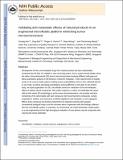Validating Antimetastatic Effects of Natural Products in an Engineered Microfluidic Platform Mimicking Tumor Microenvironment
Author(s)
Niu, Yiming; Bai, Jing; Wang, Yitao; Wang, Chunming; Kamm, Roger Dale
DownloadKamm_Validating antimetastatic.pdf (1004.Kb)
PUBLISHER_POLICY
Publisher Policy
Article is made available in accordance with the publisher's policy and may be subject to US copyright law. Please refer to the publisher's site for terms of use.
Terms of use
Metadata
Show full item recordAbstract
Development of new, antimetastatic drugs from natural products has been substantially constrained by the lack of a reliable in vitro screening system. Such a system should ideally mimic the native, three-dimensional (3D) tumor microenvironment involving different cell types and allow quantitative analysis of cell behavior critical for metastasis. These requirements are largely unmet in the current model systems, leading to poor predictability of the in vitro collected data for in vivo trials, as well as prevailing inconsistency among different in vitro tests. In the present study, we report application of a 3D, microfluidic device for validation of the antimetastatic effects of 12 natural compounds. This system supports co-culture of endothelial and cancer cells in their native 3D morphology as in the tumor microenvironment and provides real-time monitoring of the cells treated with each compound. We found that three compounds, namely sanguinarine, nitidine, and resveratrol, exhibited significant antimetastatic or antiangiogenic effects. Each compound was further examined for its respective activity with separate conventional biological assays, and the outcomes were in agreement with the findings collected from the microfluidic system. In summary, we recommend use of this biomimetic model system as a new engineering tool for high-throughput evaluation of more diverse natural compounds with varying anticancer potentials.
Date issued
2014-02Department
Massachusetts Institute of Technology. Department of Biological Engineering; Massachusetts Institute of Technology. Department of Mechanical EngineeringJournal
Molecular Pharmaceutics
Publisher
American Chemical Society (ACS)
Citation
Niu, Yiming, Jing Bai, Roger D. Kamm, Yitao Wang, and Chunming Wang. “Validating Antimetastatic Effects of Natural Products in an Engineered Microfluidic Platform Mimicking Tumor Microenvironment.” Mol. Pharmaceutics 11, no. 7 (July 7, 2014): 2022–2029.
Version: Author's final manuscript
ISSN
1543-8384
1543-8392